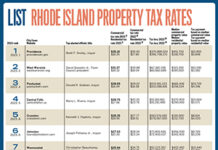Should public money be used to help build a new $83 million ballpark for the Pawtucket Red Sox?
State leaders have been reluctant to weigh in as they race to complete next fiscal year’s budget, but Pawtucket officials say the decision is easy.
“We cannot miss the moment in front of us to preserve this asset for all of Rhode Island and in the process help jump-start the revitalization of downtown Pawtucket and all of Blackstone Valley,” said Pawtucket Mayor Donald R. Grebien.
The financing deal, proposed late in the legislative session, asks Pawtucket to back a $15 million bond, which the city estimates could cost $27 million over 30 years in bond contribution.
Those costs, however, would be offset by $60.9 million in aggregate revenue generated by the stadium over the same period. The net benefit to the city could total $33.9 million, averaging to about $1.1 million per year. The PawSox would also agree to a 30-year lease. The team’s current lease ends in 2020.
If the stadium isn’t built and the PawSox end up leaving the city, it could cost Pawtucket about $57 million over 30 years, according to city estimates.
“The numbers in this agreement speak for themselves and are too good to pass up,” Grebien wrote in a letter to state leaders.
The deal also requires $23 million from the state, which could cost $42 million over 30 years. Pawtucket, however, estimates the net benefit to the state would total $179.1 million.
Leonard Lardaro, professor of economics at the University of Rhode Island, thinks the deal is bad for the state but could benefit Pawtucket in the short-term. The state’s fourth-largest city has struggled economically, he says.
“Pawtucket got cratered when manufacturing left the United States and they’ve had a very difficult time for more than a decade,” he said.
But Edward M. Mazze, distinguished university professor of business administration at URI, thinks the city’s economic-impact study is “terribly overblown.
“From an economic point of view, it would be a mistake,” he said. “It will do virtually very little to the survival or demise of Pawtucket.”
No champions have been willing to step forward among state leaders yet. So, Pawtucket’s best hope could be for a special legislative session to allow public hearings in the fall, as Senate President Dominick J. Ruggerio alluded to recently.
Asked repeatedly whether he’d advocate such action, however, Grebien has largely deflected, claiming the team could start looking elsewhere beginning July 1. A spokesman for the PawSox declined to comment on whether the team might start looking elsewhere.
“Far too much is at stake for political gamesmanship to overwhelm this process,” Grebien said.
Critics of the deal, however, feel differently.
“What this state needs to learn is how to say, ‘No,’ ” said Lardaro.











